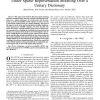Free Online Productivity Tools
i2Speak
i2Symbol
i2OCR
iTex2Img
iWeb2Print
iWeb2Shot
i2Type
iPdf2Split
iPdf2Merge
i2Bopomofo
i2Arabic
i2Style
i2Image
i2PDF
iLatex2Rtf
Sci2ools
TSP
2010
2010
Closed-form MMSE estimation for signal denoising under sparse representation modeling over a unitary dictionary
This paper deals with the Bayesian signal denoising problem, assuming a prior based on a sparse representation modeling over a unitary dictionary. It is well known that the maximum a posteriori probability (MAP) estimator in such a case has a closed-form solution based on a simple shrinkage. The focus in this paper is on the better performing and less familiar minimummean-squared-error (MMSE) estimator. We show that this estimator also leads to a simple formula, in the form of a plain recursive expression for evaluating the contribution of every atom in the solution. An extension of the model to real-world signals is also offered, considering heteroscedastic nonzero entries in the representation, and allowing varying probabilities for the chosen atoms and the overall cardinality of the sparse representation. The MAP and MMSE estimators are redeveloped for this extended model, again resulting in closed-form simple algorithms. Finally, the superiority of the MMSE estimator is demonstrate...
| Added | 22 May 2011 |
| Updated | 22 May 2011 |
| Type | Journal |
| Year | 2010 |
| Where | TSP |
| Authors | Matan Protter, Irad Yavneh, Michael Elad |
Comments (0)

